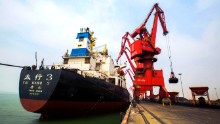North Korean ships dock in Chinese port despite coal embargo
The docking of six North Korean ships at a port in northern China has raised questions over a Chinese ban on coal imports from the nuclear-armed state.
The ships docked Thursday and Friday at a port in the city of Tangshan in northern Hebei province, near Beijing.
All six North Korean ships were loaded with anthracite coal, according to a daily docking plan published on the port of Jintang's website. Unloading times of up to six hours were listed for the ships.
Three of the ships -- the Jin Hung 9, the Woory Star and the Kum Gang San 2 -- had been due to dock since February, when China said it was halting all coal imports from North Korea for 2017 in accordance with a UN Security Council resolution passed last year.
It's unclear what the ships unloaded. The three have since left the port.
Chinese Ministry of Foreign Affairs spokesman Lu Kang said Friday that his country's policy of not accepting coal imports from North Korea had not changed.
"There have been some reports that some coal ships have tied up in port. You are aware if these ships continue to remain out at sea, away from port, we need to make some humanitarian consideration for their crews," Lu said.
He added that "nothing that violates the implementation" of sanctions had occurred.
Coal ban
Coal is North Korea's main export and an important source of foreign currencies for its fragile economy. Most of the country's exported coal is shipped to China, its only major ally on the global stage.
The link between Beijing and Pyongyang has been frayed by North Korea's repeated missile tests and increased pressure from Washington on China to act to prevent further nuclear tests by Pyongyang.
North Korea has conducted five nuclear tests since the early 2000s, all of which China has roundly condemned.
On Thursday, a day after the North Korean vice foreign minister said Pyongyang would test missiles weekly and use nuclear weapons if threatened, Lu said Beijing was "gravely concerned" about these recent nuclear and missile activities.
The Chinese official also praised recent US statements about "using whatever peaceful means possible to resolve the (Korean) Peninsula nuclear issue."
President Donald Trump has previously urged China to do more about North Korea. On Friday, he tweeted that the country was "very much the economic lifeline to North Korea so, while nothing is easy, if they want to solve the North Korean problem, they will."
Military moves
Tensions on the peninsula have been on a knife-edge amid tit-for-tat saber rattling from Pyongyang and Washington, and a major military parade in North Korea and its failed missile launch.
During a visit this week to Japan, US Vice President Mike Pence called North Korea the "most dangerous and urgent threat" to the region and vowed any North Korean attack on US forces or their allies would be met with "overwhelming" force.
According to a US defense official, China put cruise missile-capable bombers on "high alert" this week as part of what is believed to be a Chinese effort to "reduce the time to react to a North Korea contingency."
The official said the United States also has seen an extraordinary number of Chinese military aircraft being brought up to full readiness.
On Friday, South Korea said it was closely watching North Korea in the days ahead because it could "carry out a provocation at any time" around the April 25 anniversary of the founding of its army.
News Courtesy: www.cnn.com











